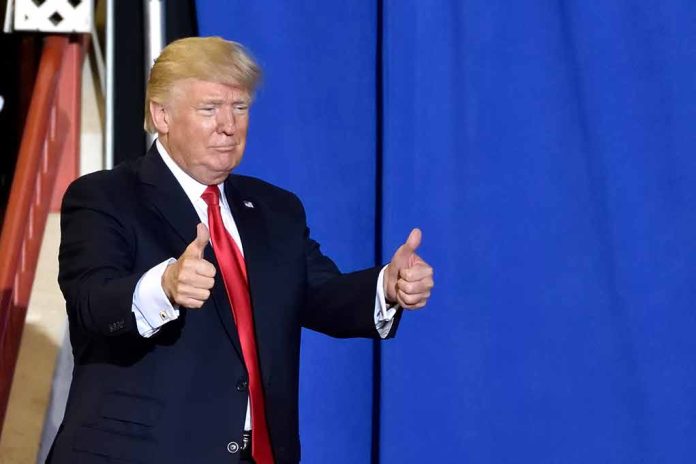
New York appeals court judges signal potential reversal or reduction of Trump’s staggering $454 million civil fraud judgment, questioning the “troubling” penalty.
At a Glance
- Appeals court judges express skepticism over the severity of Trump’s $454 million civil fraud penalty
- Judges question whether the state’s actions constitute “deterrence” or “mission creep”
- Trump’s lawyers argue the lawsuit stretches consumer protection laws and involves no victims
- A decision from the appeals court could come before Election Day, November 5
- The case stems from allegations that Trump inflated his net worth on financial statements
Appeals Court Signals Potential Relief for Trump
In a surprising turn of events, Donald Trump’s $454 million civil fraud appeal is gaining traction in the New York appeals court, offering a glimmer of hope for the former president. The five-judge panel, tasked with reviewing the case, has raised eyebrows by questioning the proportionality and justification of the enormous penalty imposed by trial judge Arthur Engoron.
This development marks a significant shift in the legal landscape surrounding Trump’s financial practices and could have far-reaching implications for both his personal fortune and political future.
The appeals court’s skepticism centers on whether the state’s actions against Trump constitute legitimate deterrence or an overreach of authority. One judge went so far as to describe the penalty as “troubling,” highlighting the growing concern over the scale of the judgment.
This sentiment echoes the arguments put forth by Trump’s defense team, who have vehemently pushed to overturn the conviction on the grounds that there was neither a tangible victim nor a formal complaint in the case.
A New York appeals court questioned whether the state’s civil fraud case against Donald Trump properly applied the law—and whether the $489 million penalty against the former president was too high https://t.co/opBEKv3W3B https://t.co/opBEKv3W3B
— The Wall Street Journal (@WSJ) September 26, 2024
Legal Battle Intensifies
At the heart of this legal battle is the allegation that Trump inflated his net worth on financial statements to secure favorable deals and loans. The New York Attorney General’s office, led by Letitia James, has argued that these actions had a significant public impact and posed undue risk to lenders. However, Trump’s lawyers contend that the lawsuit stretches consumer protection laws beyond their intended scope, pointing out the absence of direct victims or complaints.
The appeals court’s apparent receptiveness to Trump’s arguments has injected new life into his defense. The judges’ line of questioning suggests a potential willingness to either reverse the ruling entirely or substantially reduce the financial penalty. This development has sent shockwaves through the political and legal communities, as it could dramatically alter the trajectory of one of the most high-profile civil cases in recent memory.
Implications and Next Steps
As the legal drama unfolds, the implications of this case extend far beyond the courtroom. With a decision from the appeals court potentially coming before Election Day on November 5, the outcome could have significant ramifications for Trump’s political ambitions and financial standing. The former president has already posted a $175 million bond to halt collection of the judgment during the appeal process, underscoring the high stakes involved.
“The case, Sauer said, ‘involves a clear cut violation of the statute of limitations.'”
Should the appeals court decide to overturn or significantly reduce the judgment, it would not only vindicate Trump’s persistent claims of unfair treatment but also deal a blow to the efforts of his political opponents. Conversely, if the judgment is upheld, Trump faces the daunting prospect of paying nearly half a billion dollars, a sum that could potentially reshape his financial empire and political future.
As conservative Americans watch this case unfold, many see it as a litmus test for the fairness of the judicial system and the extent of government overreach. The apparent willingness of the appeals court to scrutinize the lower court’s decision offers a ray of hope for those who believe Trump has been unfairly targeted. Regardless of the outcome, this case serves as a stark reminder of the complex interplay between politics, finance, and the law in America’s highest echelons of power.






















